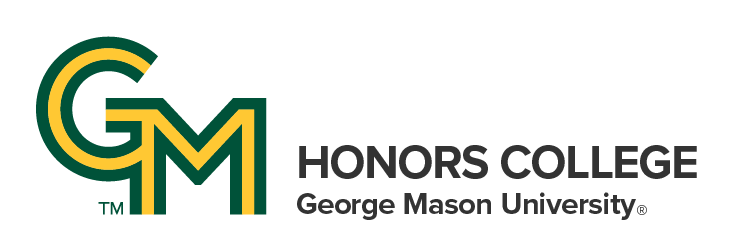
Campus delivery robots
How the Starship Robots made their way into Honors College classrooms
When Honors College students returned to campus this semester, they were greeted by some new, unexpected campus residents: the little boxy, six-wheeled starship delivery robots.
The robots are from Starship Technologies, a tech company based in San Francisco, which has teamed up with George Mason to provide a self-driving food delivery service.
Professor Dean Taciuch, who teaches Honors 353, expressed excitement over the robots’ presence on campus. “They talk! That kind of feedback is very important in getting people to accept them as part of the campus environment. I am happy to see that people are helping them out, not worrying about them, or trying to hinder them,” said Taciuch.
Until this semester, Honors 353: Technology in the Contemporary World has offered a space for Honors College students to undertake multidisciplinary research into topics ranging from from post-humanist theory to emerging technologies through history. Starting in Fall 2019, students seeking these experiences will take Honors 360 Multidisciplinary Topics classes instead. Many of the same courses will be offered. For instance, just like the Honors 353 he has offered in the past, Taciuch’s section of Honors 360 will cover Cybernetics, which is the science of communications between living and non-living systems.
His class addresses technology from the perspectives of a wide range of disciplines. According to Taciuch, the robots have been discussed in his class this semester, where emerging artificial intelligence is a core theme.
“I am amazed that they can find their way around the construction on campus,” continued Taciuch. “Whatever maps they have access to are outdated daily, so they are obviously very adaptive. From what I’ve read, once one of the bots finds a new route, it can tell the others. The maps they use are regularly updated without human intervention.”
Professor Zachary Schrag, who teaches another section of the course previously known as Honors 353 on Innovation and Adaptation, has also discussed the robots in his section of the Multidisciplinary Topics course.
It’s great for teaching, to have technology underfoot helps illustrate a lot of the concepts we discuss.
Professor Zachary Schrag
However, he voiced some concerns about the robots’ impact on campus life. “There’s some discussion about people with mobility impairments, whether they will have a harder time navigating walkways with the robots around that non-impaired students. These are the kinds of conversations I hope make it into the classroom.”
Schrag’s section of honors 353 is focused on the history of innovation, and students work in groups to trace the history of technology in use today. He encourages students of all majors and interests to actively participate in debates about technology. He emphasized the multidisciplinary nature of the class.
This is a premise of the Honors College: to have multidisciplinary perspectives on any problem, including problems of technology. One of the things these robots highlight is how important it is to involve the humanities and social sciences in something that is labeled as a technical question.
Professor Zachary Schrag
For students interested in engaging in debates about technology, Professor Taciuch’s Honors 360 Multidisciplinary Topics: Cybernetics and AI will be offered in the fall. For those interested in crafting individually driven projects focused on the role of technology in society, students should consider Honors 361 Multidisciplinary Practicum: Multidisciplinary Research and Creative Projects, taught by Dean Zofia Burr and Richard Todd Stafford.
Original videography and reporting by Leah Antler
